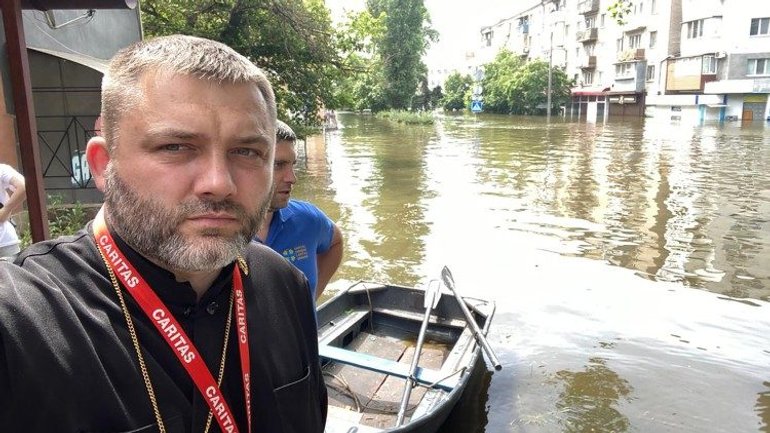Director of "Caritas-Kryvyi Rih" talked about assistance to the victims of the explosion at Kakhovka Hydroelectric Power Station

"The scale of this tragedy can only be assessed over time," Father Ivan Talailo notes in the interview with Radio Vatican - Vatican News, commenting on the consequences of the destruction of the Kakhovka Hydroelectric Power Station dam.
The priest mentioned that on Thursday, June 8, he and some representatives of Caritas-Kryvyi Rih went to Kherson. "Many organizations have joined in providing assistance, supplying people with basic necessities (food, water, etc.)," he said. "So we are monitoring the situation, communicating with the authorities, and trying to assess what kind of assistance people will need in one or two weeks. Because people in the flooded settlements below the dam mostly do not want to leave, only about 10% have been evacuated. They stay near their villages, waiting for the water to recede, and they will return home if they have somewhere to return to. And that is why we want to help them and be as helpful as possible programmatically."
Father Ivan added that "Caritas-Kryvyi Rih" is delivering about 5 tons of drinking water per day to the villages of the Kryvyi Rih district and the Kherson region. In one of the flooded villages near Kherson, he saw a completely destroyed private house. "The house was old, and it simply collapsed," he says. "And I understand that the people who lived there were left with nothing. Within an hour, the water reached them, and they only managed to escape from the house with their documents and a bag. And that is why these people will need comprehensive assistance."
The director of Caritas-Kryvyi Rih mentioned that they plan to create a hub in one of the villages near Kherson to deliver aid to the affected individuals. "We cannot do this in Kherson," he explained, "because it is a very dangerous area due to shelling. Even yesterday, one person was killed. We must try to do good in a way that those who do it will not be harmed because we are responsible for our employees and volunteers."
Danger will remain even after the water recedes
Father Ivan Talailo pointed out that the flooded settlements will remain dangerous even after the water recedes because they are constantly under shelling by the Russian army stationed on the Left Bank. "Also, when we were in Kherson, drones were flying above us, and gunfire could be heard, so we tried to be responsible in this regard. And the people who live there have already gotten used to it. They have no more fear, and this is very bad because a person does not feel danger. Therefore, unfortunately, it sometimes happens that people die."
House destruction and other devastating consequences
Among the consequences of the flood, according to the director of Caritas-Kryvyi Rih, there is damage not only to private houses but also to multi-story buildings. "In Kherson, we spoke with an engineer who said that five-story buildings, for example, have very weak foundations, the ground becomes heavily soaked, and they will have at least very large cracks, and it will be dangerous to live in them," the priest says.
Father Ivan Talailo also noted that the situation is exacerbated by the fact that the water is flowing through the villages and the streets of towns for a very long time, which leads to erosion and the destruction of road infrastructure.
Aid from the state and local authorities
In conclusion, Father Ivan emphasized that assistance from the state and local authorities is necessary in such situations. "Because if there is no prompt reaction from the state, it will be very difficult for us to help," he says. "We, as a Church, as Caritas, have volunteers, but we have no means or ability to provide such assistance to everyone. We only do what we can. And, of course, it is very important for the state to react promptly and provide comprehensive assistance to people."









